When a bad choice is better than no choice
Posted on | December 11, 2019 | No Comments
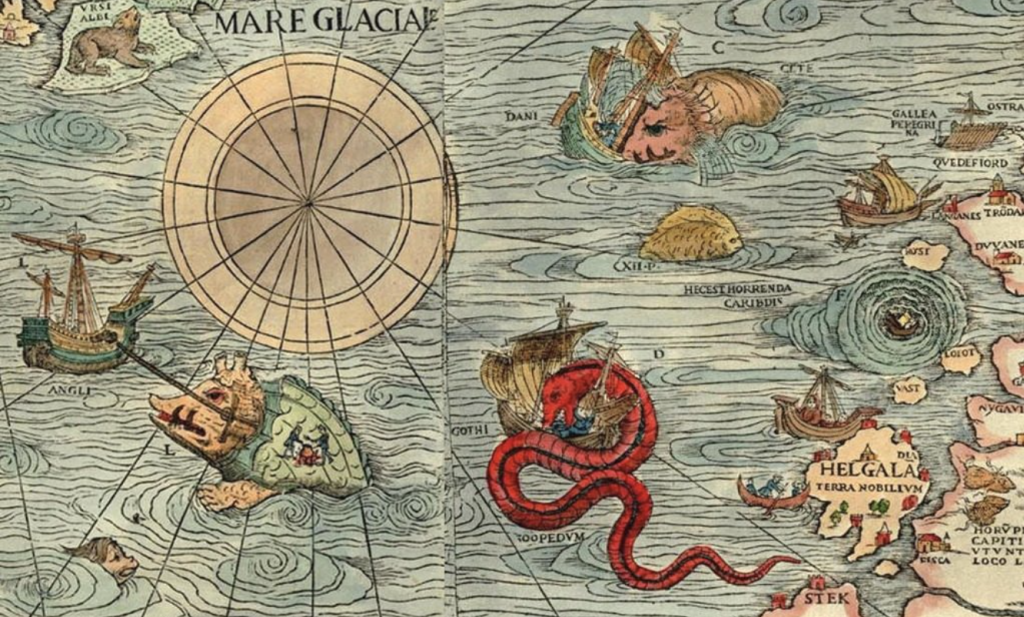
Tomorrow Britons go to the polls. Americans should take note. As proved the case with the 2016 Brexit referendum shortly followed by the Trump victory in the U.S. general election, what happens there tomorrow may be the strongest portent we have as to what will follow here in November. *Updated 12/13/19
For those unfamiliar with the candidates, representing British Conservatives is Boris Johnson, father of Brexit. For Labour, there is Jeremy Corbyn, an old school socialist under whose leadership the 1990s-prefix “New” of “New Labour” has been scrubbed, along with centrist support and party dominance. For the Liberal Democrats, there is Jo Swinson, a millennial Scottish MP whose once-marginal party may have sudden heft if neither Labour nor the Conservatives emerge with a commanding majority.
A tendency in the U.S. to see Corbyn as a British Bernie goes only so far. Corbyn, 70, cycles, makes jam and grows vegetables in an allotment. His bookend cause to Bernie’s Medicare for All is nationalizing the Internet. But, unlike Bernie, who rarely if ever dodges a question, Corbyn can and does waffle, even when it most matters. His sense of solidarity for Labour constituencies that suffered during compliance with E.U. fishery quotas, food safety and pollution regulation seems to have reduced Corbyn to the claim that he’s “neutral” on Brexit. Given the E.U.’s importance in facing the climate crisis alone, this should be a disqualifying abdication. To mollify his party’s Remain (in the E.U.) base, Corbyn has promised the public a new referendum on any Leave package and a new Remain choice.
A reporter-turned-columnist and, full disclosure, old friend, the Observer’s Nick Cohen, isn’t buying it. Nick characterizes Corbyn as having been at various times in his career pro-Putin, pro-I.R.A., pro-P.L.O., anti-semitic and incompetent. Myself, I can’t see it all, or even half of it, but he may be right. For those of us too far away to understand if charges against Corbyn aren’t the same as outcry over controversial remarks by Reps Ilhan Omar of Minnesota and Rashida Tlaib of Michigan here, the U.K. writer Sara Gibbs offers this trenchant background look at Labour’s failure to grapple with anti-semitism.
And yet: however bad Corbyn is, Johnson is worse, especially as the Brexit campaign-inspired murder of MP Jo Cox should remind us, in matters to do with tolerance. Corbyn would have to be Beelzebub himself to lose my support given what is at stake if Johnson wins. If it made a difference to check the Lib Dem column, I’d do as actor Hugh Grant is advocating and vote tactically for Swinson. Why? Because Johnson is the flip side of the Trump coin and a Johnson win augurs a Trump second term. And Trump’s wholesale bigotry, including anti-semitism, is about as subtle as the march of Charlottesville.
Johnson, like Trump, behaves as if rules are for other people. A second class degree at Oxford in the 1980s swiftly became a first class job at the Times of London. Fired from there for fabricating a quote, he moved to the conservative Daily Telegraph, where, as Brussels correspondent he claimed sniffers were deployed to ensure that Euro-manure smelled the same as British. That it was false didn’t stop it from delighting editors as colorful, recalled Martin Fletcher in the New Statesman. Nor, as Johnson claimed, did Europe attempt to classify snails as fish, standardize condom sizes or ban prawn cocktail-flavored potato chips.
Fletcher, the former Times of London foreign editor, found this description of the period by Johnson. It was “all sort of a jape,” Johnson said. “[I] was sort of chucking these rocks over the garden wall and I listened to this amazing crash from the greenhouse next door over in England as everything I wrote from Brussels was having this amazing, explosive effect on the Tory party – and it really gave me this, I suppose, rather weird sense of power.”
Decades later, the British prime minister’s “weird sense of power” has resurrected the National Front while Brexit stands to undo the peace in Ireland made possible by open borders. As Nick (no fan of Johnson’s either) not long ago explained for Americans in the Washington Post, British and Irish membership in the European Union forged “a deal allowing the Catholic nationalists in Northern Ireland to feel Irish and largely protestant Unionists to feel British.”
Front and center of tomorrow’s election are a litany of Johnson 2016 claims over the riches that Brexit would return from Europe to the National Health Service that never materialized. A single disinformation campaign designed to protect Johnson in one 24-hour cycle alone this week was summed up by the non-partisan First Draft. Its hour-by-hour breakdown of how an army of bots waged a social media assault on a northern local newspaper and family of a sick child waiting for a hospital bed is horrifying — not least to an American because the same bots have been traced to MAGA campaigns.
To the astonishment of the editor of the Yorkshire Evening Post, the bot attack carried an alternative explanation as to why a sick child was pictured sleeping on coats on a hospital floor: The parents staged it. Seeded across Facebook and Twitter, within hours this counter version was re-Tweeted, then embellished, by comic novelist and Daily Telegraph columnist Allison Pearson.
Now, even those of you who live far from Britain, pause to imagine what it would feel like for a a regional newspaper editor, or the parents of a sick child, to be abruptly, bizarrely and publicly vilified by a writer so famous that her fictional alter ego movie had been played in a Hollywood movie by Sarah Jessica Parker. Within hours of of Pearson having roused the cyber forces against a family with a sick kid and diligent provincial newspaper, her the-parents-faked-it narrative had been debunked. Pearson deleted her key Tweet, blocked the Twitter account of the editor of the Yorkshire Evening Post, and ignored a call from the Labour MP David Lammy to issue an apology to the family.
NRPI, no real people impacted.
Or, as Pearson’s husband, New Yorker film critic Antony Lane demanded in a a contemptuous review of the film “Shattered Glass” about the fake news scandal that rocked the National Review. “What, pray, is the big deal?”
The big deal, then as now, there as here, powerful people or humble, is the truth. No community can choose its leadership, and best path, without it.
Update 12/13/19: On the heels of a Johnson landslide, as if validating his hatred for Corbyn, Nick promoted this:
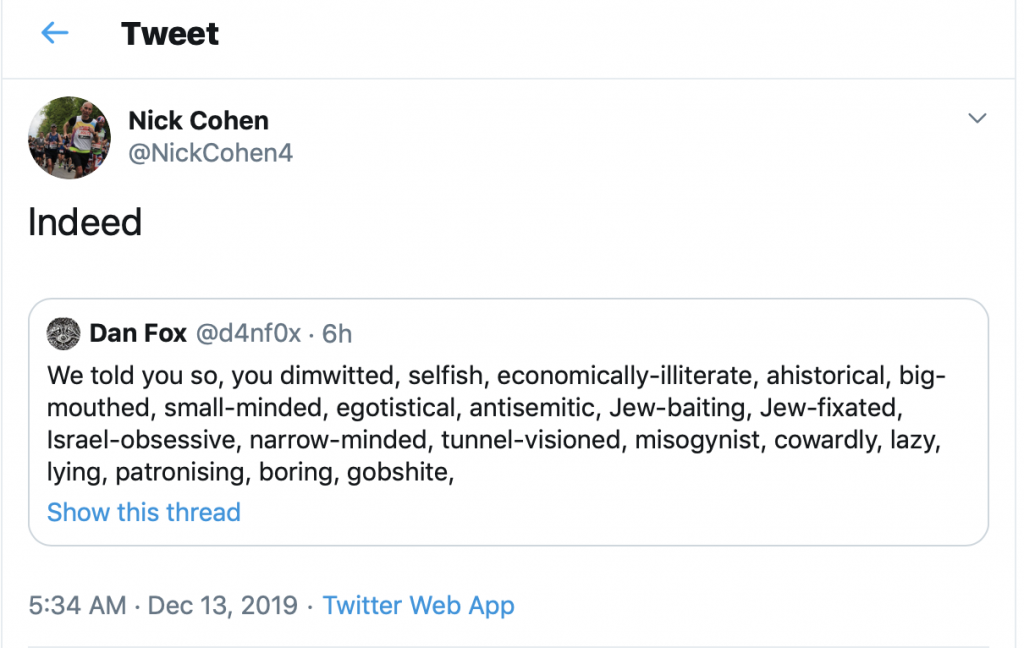
The Observer reporter who has done most to track disinformation in 2016 Brexit and Trump elections Carolyn Cadwalladr responded with this:
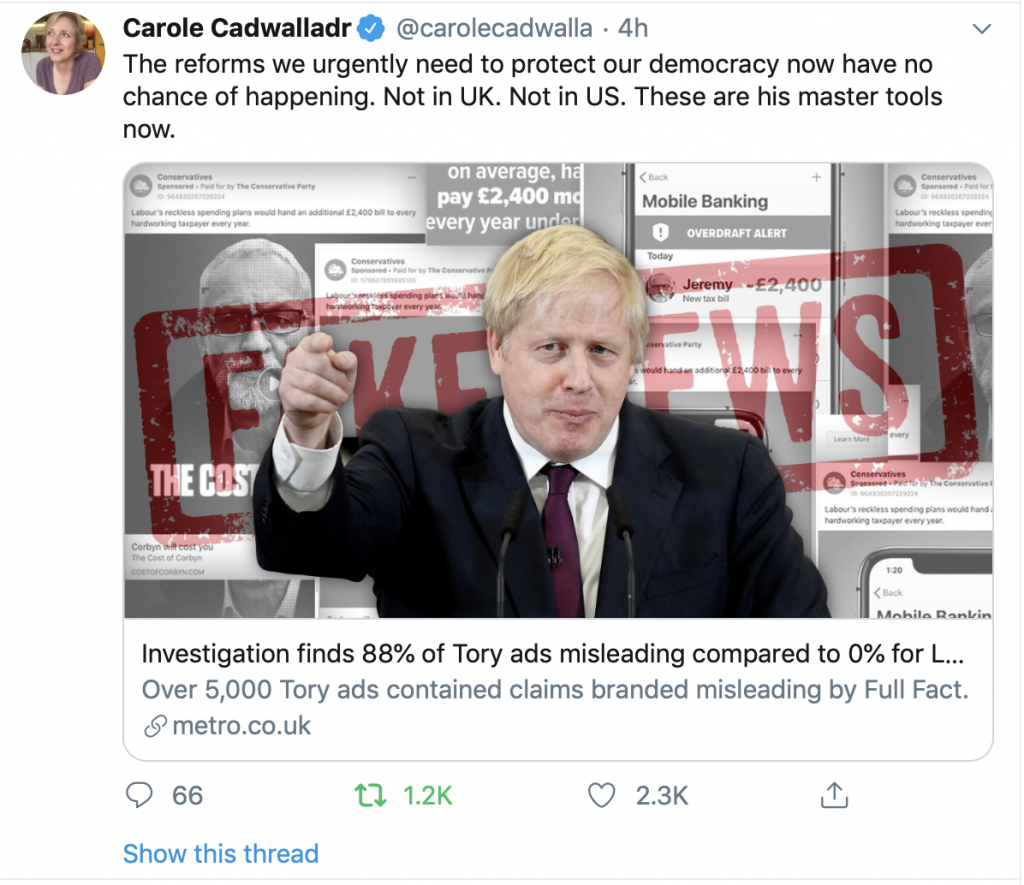
And the Guardian’s most prescient, insightful climate politics columnist George Monibot this:
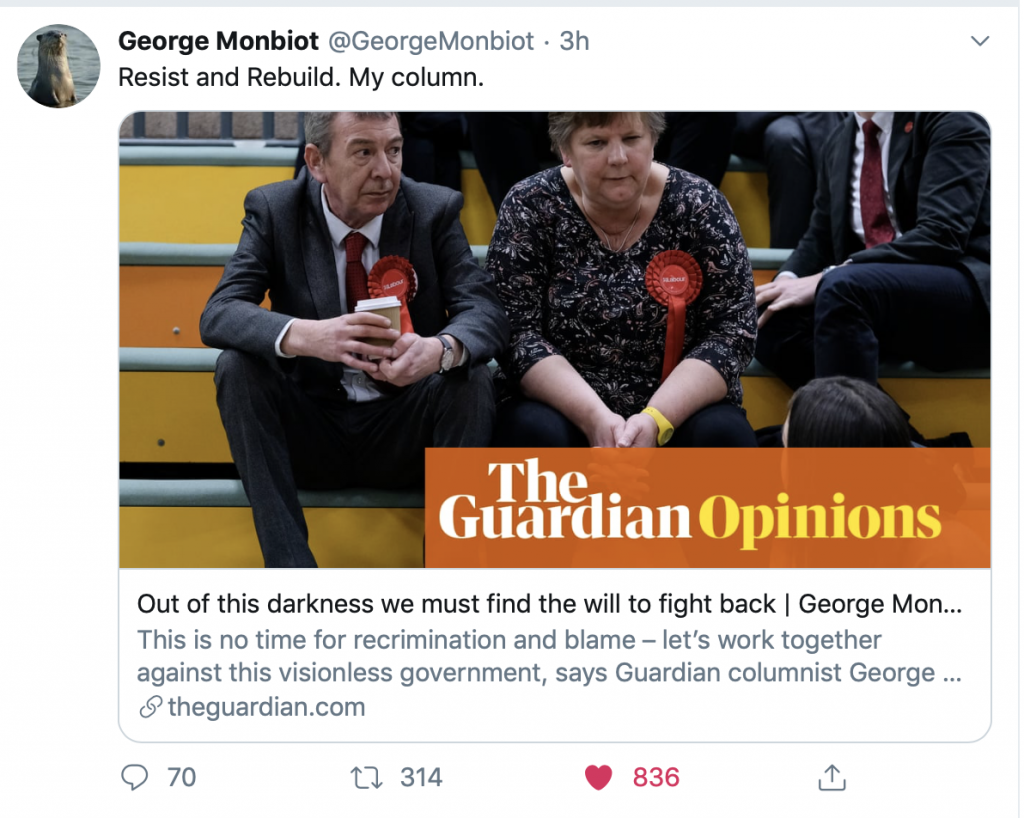
And Donald Trump, this:
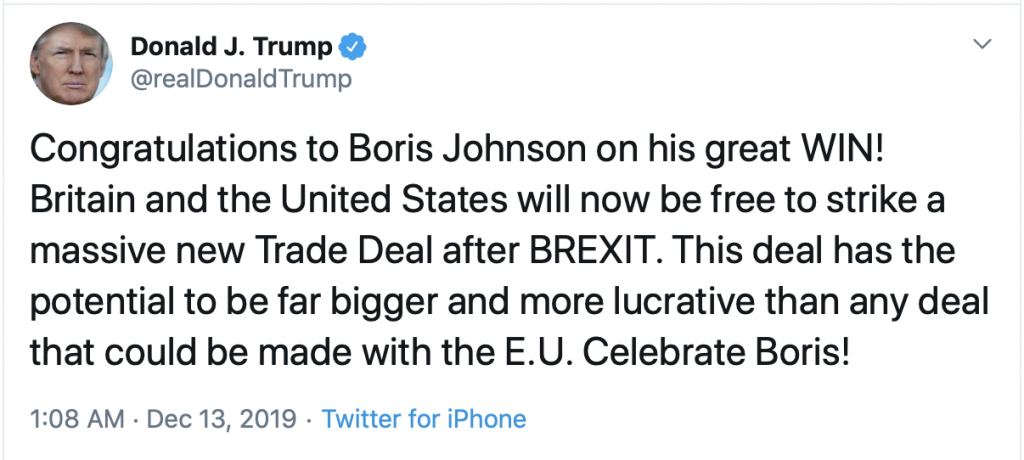
We know that the same backers and same disinformation campaigners who triggered Brexit and elected Trump in 2016 backed Johnson. As we go into the 2020 election here, no one should underestimate what this could mean for the U.S.
Comments
Leave a Reply


